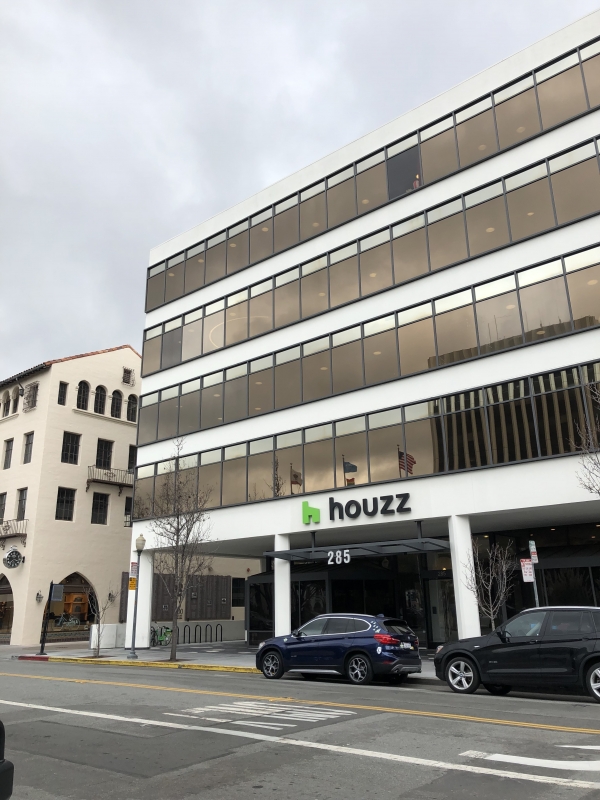For employees in downtown Palo Alto who wish their workplaces had roof decks, things are suddenly looking up.
In a broad expansion of its original plan, the City Council passed on Monday night an ordinance that would allow downtown buildings that are too tall or too dense to meet the city's zoning code to add roof decks. In doing so, the council agreed to go well beyond the initial staff proposal, which would have limited the new law to seven buildings that exceed the city's 50-foot height limit.
Instead, by a 5-2 vote, the council voted to broaden the law so that it applies not only to buildings that are too tall to comply with the current development standards but also to those that are too dense. The revision expands the number of downtown buildings that can apply for roof decks from seven to more than 110, according to city planner Graham Owen.
Council members Tom DuBois and Lydia Kou both dissented, citing the potential noise that would be created at the dozens of new gathering places.
In passing the law, the council generally agreed that roof decks are a desirable amenity, particularly in the downtown area. That view is shared by Houzz, the interior-design company that asked the city in 2017 for a permit to construct a roof deck at 285 Hamilton Ave., directly across the street from City Hall. The request, which was vetted by the council in November 2017 and which won the Planning and Transportation Commission's support last October, received the council's long-awaited blessing on Monday night.
In approving the Houzz proposal, the council also agreed to extend the option of building roof decks to other properties. Council members Adrian Fine and Liz Kniss both strongly supported the broadest option on the menu: extending the roof-deck ordinance to every type of non-conforming building in the downtown area. Councilwoman Alison Cormack went further and suggested staff explore a similar policy for California Avenue and other parts of the city.
Kniss called roof decks "a lovely amenity to have."
"Certainly, if I were in an apartment building, I'd think it's an absolute asset to have a rooftop," Kniss said. "I support this enthusiastically."
Roof decks aren't new in Palo Alto, though until this week they were only allowed only on grandfathered buildings, such as the President Hotel at 488 University Ave., and those that could add the amenity without exceeding the city's height and density restrictions.
Kou argued that giving the right to facilities that are already too tall and dense to comply with the law amounts to "double dipping" — allowing property owners who already have too much to have even more. She also argued that the proposal constitutes "spot zoning" because it applies only to a handful of private properties.
"It's something I just cannot support because there's not enough benefits to the community," Kou said.
DuBois also voted against the new ordinance but only after he persuaded his colleagues to add a few restrictions. Rather than allowing roof decks to be operational between 6 a.m. and 11 p.m. daily, as proposed by staff, DuBois successfully lobbied his colleagues to shorten the hours (under a compromise, the council settled on 8 a.m. to 9 p.m. daily).
DuBois also succeeded in adding a provision prohibiting amplified sound on roof decks — a proposal that passed by a 4-3 vote, with Fine, Kniss and Councilman Greg Tanaka dissenting. DuBois noted that the council had recently revised its roof-deck rules for new residential developments, decreeing that roof decks can satisfy the zoning code's "open space" requirements for housing projects. At that time, the council agreed to ban amplified sound out of concern that it will disturb the occupants of neighboring properties.
"I think there's some value to have consistency in our ordinances for residential and commercial," DuBois said.
In a bid to limit rooftop parties, DuBois also proposed an amendment requiring that only the building's occupants and employees be allowed to use roof decks. That proposal failed 3-4, with Mayor Eric Filseth and Kou supporting him and everyone else opposed.
The council majority sided with John Shenk, CEO of Thoits Brothers, which owns 285 Hamilton Ave. and which has been heavily lobbying for a roof deck. Shenk said the company's new building at 500 University Ave. has the largest roof deck in the city. To date, it has not received a single complaint from any surrounding properties — a list that includes the Garden Court Hotel.
"To me, it's a crucial, valuable fact because hotel guests are picky," Shenk said. "They spend a lot to spend a night in our beautiful downtown and they are directly across the street from a roof deck."




Comments
Registered user
College Terrace
on Feb 26, 2019 at 10:36 am
Registered user
on Feb 26, 2019 at 10:36 am
There's a lot to like about roof gardens - they are lovely, they are a good use of space, they are fun to use, etc. But the two dissenting votes are also reasonable. It will be important for those who get the privilege of having a rooftop garden to comply with the CUP.
And important for the City to enforce the terms of the CUP. If the terms are ignored, what's the consequence? Not enforcing the Castilleja CUP has proven problematic. Let's not repeat that.
Old Palo Alto
on Feb 26, 2019 at 12:45 pm
on Feb 26, 2019 at 12:45 pm
Kniss: "Certainly, if I were in an apartment building, I'd think it's an absolute asset to have a rooftop," Kniss said. "I support this enthusiastically."
Such a warm endorsement of her primary loyalty to developers.
And, as usual, her egocentric experience to justify city-wide rules.
That's right, Liz, as you said, there is no traffic problem in Palo Alto.
Downtown North
on Feb 26, 2019 at 1:03 pm
on Feb 26, 2019 at 1:03 pm
Once again, the pro-developer majority (Alison Cormack, Adrian Fine, Liz Kniss, and Greg Tanaka) voted to go beyond staff recommendations to favor commercial interests over residential needs.
Of course, we already knew the majority would go all-out on roof decks when they voted to allow roof decks on residential buildings to replace outdoor open space requirements. Like parents would be thrilled to allow their children to play on a sky-high roof deck instead of a street-level playground.
With every land use decision, the majority is removing restraints on commercial development, with full knowledge that the city will not enforce the few limits they are wiling to put in place. Disgraceful.
Registered user
College Terrace
on Feb 26, 2019 at 1:39 pm
Registered user
on Feb 26, 2019 at 1:39 pm
Finally we are doing something interesting and vibrant again in downtown. Gad to see a good majority of CC supporting some small innovation, as opposed to the frequent obstruction we usually see when folks lump all of development, office space, parking, noise etc. into an insurmountable stumbling block. Yes, change and progress do have side effects, but with good intentions, generous spirit and some monitoring this may breathe life into town, and help get PA's mojo back again.
Crescent Park
on Feb 26, 2019 at 1:44 pm
on Feb 26, 2019 at 1:44 pm
Arbitarian- or one could look at it this way, one again the pro-pasz. Anti- everything council members were prevented from imposing their desires on the city. Just remember that the voters chose a "pro- developer" council.
This wad the right decision- kuo is the new holman, against everything. And Dubois is just trying to use the same scare tactics when he opposed the sign at grocery outlet.
And I agree arbitarian, kuo and Dubois actions are disgraceful.
Downtown North
on Feb 26, 2019 at 11:02 pm
on Feb 26, 2019 at 11:02 pm
Gimme --
You have misrepresented my remarks. To be clear, I wrote that Alison Cormack, Adrian Fine, Liz Kniss, and Greg Tanaka have been disgraceful in their all-out advocacy of commercial interests over resident needs.
You wrote:
"Just remember that the voters chose a 'pro- developer' council."
Just remember, during the campaign Alison Cormack said she saw no reason to overturn the downtown commercial cap, but then voted to do so. She misled voters into believing she would not be a 100% "pro-developer" council member.
On the other hand, Lydia Kou and Tom DuBois' votes are perfectly consistent with their campaign pledges. Their honesty, integrity, and resident support is a refreshing contrast to the duplicity displayed by their pro-developer colleagues.